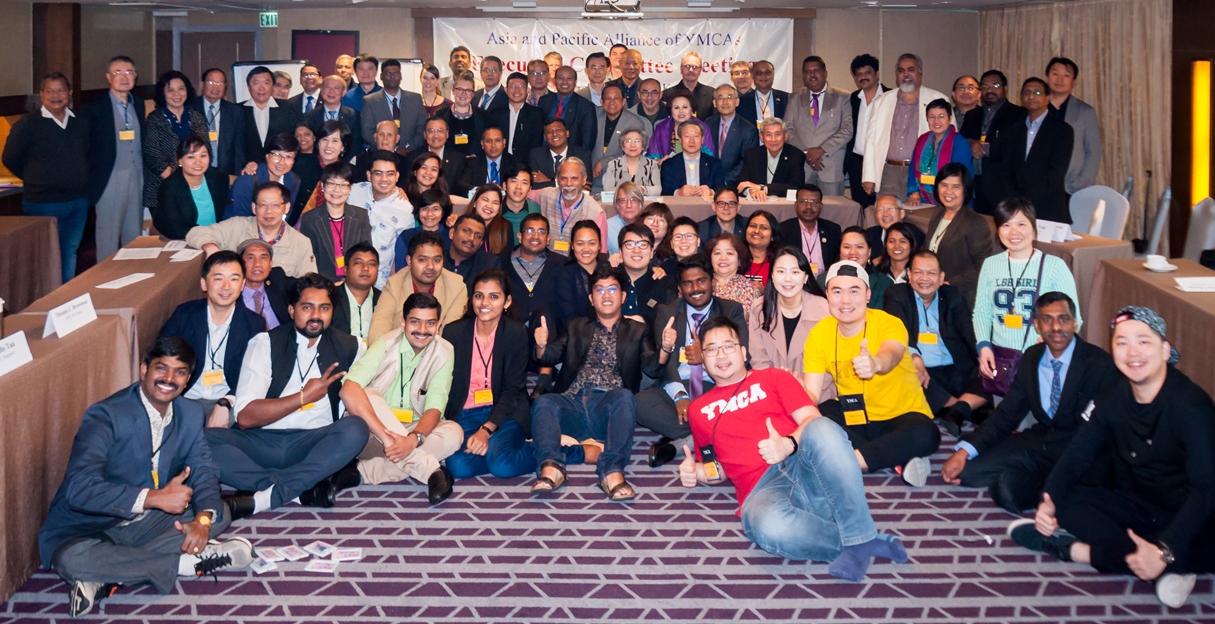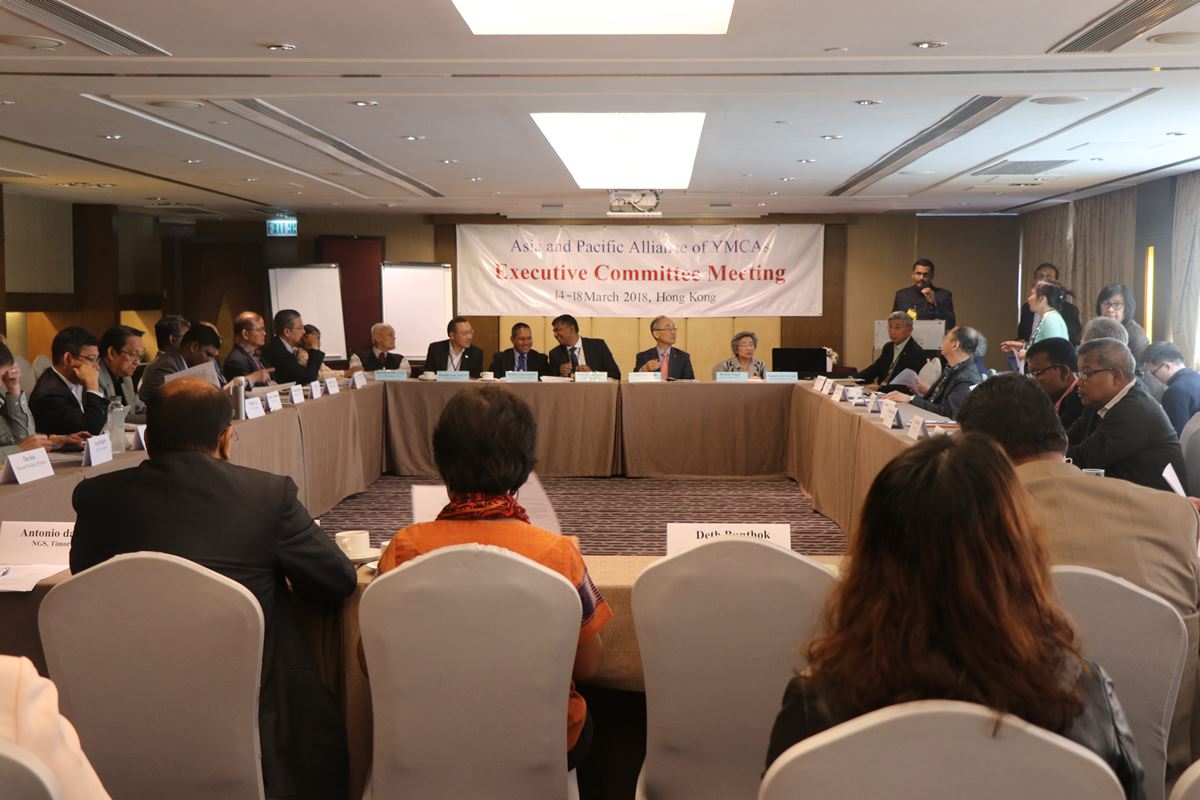Communiqué: Executive Committee Meeting, 14-18 March 2018, Hong Kong
Last Updated (Tuesday, 10 April 2018 17:55)

The Asia and Pacific Alliance of YMCAs (APAY) held its annual Executive Committee Meeting from 14-18 March 2018 in Hong Kong. This year, 149 delegates from 21 movements and the Organising Committee of Luang Prabang YMCA, Laos in the Asia-Pacific region attended the meeting. Special guests included former APAY Presidents Philip Kwok, Chim Hou Yan and Park Jai Chang; partners from YMCAs of Canada and USA. There were also representatives of Y’s Men International, including its International President Elect, Moon Sang-Bong and International Secretary General, Takao Nishimura, to have a Y’s-Y joint partnership meeting during the ECM.
The ECM is meeting at a very crucial time in the Asia Pacific. Despite seemingly significant economic developments that have taken place in many countries, poverty, conflicts, human rights abuses, and geopolitical tensions continue to remain as serious challenges for the people. The recently concluded Winter Olympics brought some rays of hope for peace in Northeast Asia. Beginning with a combined North-South Korean sports team, the sports diplomacy developed further into dialogues between officials from North and South Koreas. And now, we look forward with expectations and prayers that warmer peace will emerge from the meeting between North Korea and the USA. We believe it is critical time – a Kairos time – for us who wish a world governed by genuine peace to act for peace-building with a sense of urgency and APAY is called upon to respond proactively.
The Challenge 21 clearly states the two imperatives both on ‘peace-building’ and ‘conflict resolution’ as follows:
- Fostering dialogue and partnership between people of different faiths and ideologies and recognising the cultural identities of people and promoting cultural renewal
- Seeking to be mediators and reconcilers in situations of conflict and working for meaningful participation and advancement of people for their own self-determination.
Within these contexts, the meeting started with one day of learning sessions to enhance the social relevance of the YMCAs.
Mission Review Session
Dr. M.P. Joseph, a theology professor, called on the ECM participants to revisit the mission priorities of YMCA considering speculative finance capitalism. Today, giant capitalist institutions distort the meaning of development and pursue projects that violate the dignity of human beings. The turning of persons into disposable commodities is exemplified in the phenomenon of the migrant workers. Hedonist, death-dealing neoliberal economy, and finance capitalism have changed the world by desecrating life. Thus, YMCA must revisit its mission and self-evaluate to redefine its identity considering Jesus’ call to discipleship. The theology of hospitality must be strengthened, for one sees God’s face in the face of the stranger. In relation to this, the “muscular theology” symbolized by sports and gyms can be re-conceived as a theology of training a strong body to protect the weak, the hungry, and the oppressed. Our incarnational response to God makes the incarnation of God continue in human history. This incarnational necessity calls for unity of citizens of the oikos and this can be done only if human beings take the world contexts seriously.
Learning Sessions 1 and 4
We are glad to have the opportunity to learn from friends in other regions about strengthening the YMCA institution in order to reach out and respond to the needs of the larger communities.
YMCA-Canada envisions having a YMCA that is sustainable, relevant, and having impact. This demands strengthening of YMCA’s operating models through evolution of the federation’s system to support modern, vibrant YMCAs eg., using technology to create transformative programs and services; extending the core YMCA programs to underserved constituencies; training leaders for tomorrow, and doing advocacy and fostering global minds.
The USA is among the largest immigrant receiving countries. Although one out of five is a child of an immigrant, most immigrants still struggle for their integration in the state. Y-USA seeks to be more socially relevant and responds to this challenge through its Newcomer Immigrant Strategy Program. This program provides a “safe space” for newcomers and builds bridges between immigrants and US citizens.
Learning Sessions 2
Max Ediger shared that peace is not the absence of war or conflict; it cannot be enforced through laws and military actions. JustPeace comes when the people experience restorative justice and harmony. JustPeace comes only when prayers become action. The calling to the prophetic ministry is also a call to prophesy against false gods of today and to transform that Road to Jericho. It is also a call to servanthood. The main task of the YMCAs is to prepare youth to be the prophets of the world so desperately needs today. They must find the courage to comfort the afflicted, but also to afflict the comfortable. To develop these prophets, we need to provide them the opportunity to be with those who are suffering from the abuses of our present societies, hear their stories and become a voice for justpeace.
Learning Session 3
Rev. Song Kyong Yong advocated for a social economy in the face of the contemporary crisis. Social and Solidarity Economy (SSE) is about the production of goods and services by a broad range of organization and enterprises that have explicit social and environmental objectives. Rev. Song shared that the core values of SSE, such as cooperation, solidarity, ethics, and democratic self-management are compatible with YMCA values. SSE, being a people-oriented economy, is an alternative to the destructive neoliberal economy that brought economic crisis resulting to high incidence of poverty, ecological imbalance, social exclusion of minorities especially women and children, among others. SSE is dubbed as “capitalism with a face” and offers a sustainable, inclusive development. There are many case studies of successful SSE’s in the various areas of enterprises from all over the world. SSE is a revolutionary economy that brings well-being and peace to communities and the world.
Morning Devotions
The morning devotions and Bible studies focused on the themes of social relevance of the YMCAs. The first Bible study was on Matthew 25:31-41. Compassionate ministry is done because we want to encounter Christ. Social service is a spiritual exercise and commitment, and an expression of radical dependence on God. The second Bible study was on Philippians 4:2-3 and Esther 1:1-22. It was highlighted that early on, women leaders and preachers have already worked as equals with Paul. Biblical interpretation requires new lenses in reading, such as the book of Esther. Esther maybe a hero, but she eventually misused power and ordered genocide as a claim to retributive justice. God spoke through Vashti’s feminist beauty and defiance against the patriarchal norms of treating women as a sex object.
 Reports
Reports
The main thrust of the QPP is to empower people, especially the youth, to be servant-leaders and responsible citizens in YMCAs and societies. They must respond to the social realities and transform their communities through creative and innovative approaches. This should be a shared responsibility of the YMCA. Each member- movement’s constituents have potentials and capacities to take shared leadership as bearers of the YMCA Mission. Believing this to be our collective quest and collective legacy, various committees of the APAY deliberated their roles for the coming year.
The Committee on Gender Equity Committee emphasized that the work on gender justice is a resonance of the YMCA mission and our relevance to the society. Thus organizational and community-based actions promoting and advocating for human rights must be committed by all involved in the movement.
As for the Youth Participation and Leadership Development Committee, the importance of sharing national/local programs among members provided opportunities to learn more about the diverse engagement and actions within the region with regards to youth empowerment. It was also expressed that the ECM could be made more youth friendly by providing opportunities for youth led-sessions and facilitation.
The Mission Response Committee emphasized that the YMCA is basically a service organization. Consequently, the Mission Response Committee is a vital component of APAY as it is responsible for ensuring that YMCA continues to remain true to its mission... Thus, the committee maintains the primary responsibility for safeguarding the social relevance and Christian values in the work of the YMCA. The program components of APAY such as GATN, Justice and Peace, Ecological Concerns, Interfaith Cooperation Forum, and the Advanced Studies are crucial in the realization of YMCA’s mission. Peacebuilding is highlighted as the urgent calling of these days in East Asia especially, between North and South Korea. APAY seeks to contribute to the building of peace in the region and in the world.
The YMCA from its early beginnings in the middle of the 19th century has had in its DNA a strong foundation of Christian beliefs and teachings – what we call “ecumenical spirit”. In the launching of the book “Light to our Path”, the APAY hopes that it will help local YMCAs to collectively seek rigorously what it means to be a Christian-based organisation in the contemporary world.
The Executive Committee Meeting concluded with a call to reflect on the message lifted from Luke 4:18-19, that is, “The Spirit of the Lord is upon me, because he has anointed me to bring good news to the poor. He has sent me to proclaim release to the captives and recovery of sight to the blind, to let the oppressed go free, to proclaim the year of the Lord’s favor.” As a faith based organization, we need to anchor our actions with compassion and humility. Our core values of love, justice and peace will lead us towards the upliftment of human dignity.
